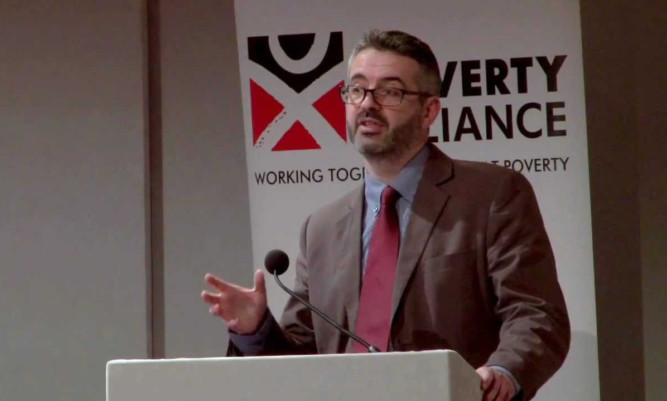The next Scottish government should introduce anti-poverty legislation to comprehensively tackle the issue, campaigners have said.
The call for a Scottish Poverty Reduction Bill is one of 17 priorities for Holyrood set out in the Poverty Alliance’s election manifesto.
The alliance – which is made up of more than 200 member organisations – has also called for an increase to working age benefits and a ban on tax evaders from public contracts.
With new powers over tax and welfare coming to the Scottish Parliament, it says there has never been a better time to re-consider the approach to tackling poverty.
A Scottish Poverty Reduction Bill would require the production of a long-term anti-poverty strategy, periodic reviews of the strategy, and the “active engagement of civil society and people with experience of poverty in its development and review”, its manifesto states.
The Poverty Alliance is also calling on Scottish parties to commit to using new powers to top up child benefit and the benefits of working age adults, and use tax powers progressively.
Other priorities include the exclusion of those who practice tax evasion from public contracts, a redesign of the assessment process for disability benefits, and tackling negative attitudes towards those living in poverty.
The group also wants a future government to introduce a socio-economic impact duty to require public bodies to use their powers to reduce inequality.
Peter Kelly, director of the Poverty Alliance said: “We’ve had 17 years of the Scottish Parliament, and poverty remains deeply ingrained. Today we are presenting 17 demands that we believe will lay the basis for a fairer Scotland.
“It was clear following the independence referendum that there was a widespread desire for more powers to the Scottish Parliament. While the package being devolved may not be as exhaustive as many would have liked, they are still significant and it is vital that new powers are used.
“As an organisation primarily interested in tackling poverty, the Poverty Alliance is principally concerned about how we use these new powers, alongside existing powers, to create a more socially just Scotland.
“This will not be easy, and there are tough choices ahead for whoever makes up the next Scottish government.”
The manifesto coincides with the publication of the Scottish Anti Poverty Review which contains articles from Scotland’s five main political party leaders setting out their views on how best to tackle poverty in Scotland.
SNP leader Nicola Sturgeon said her vision “is of a prosperous, productive, high-wage country where everyone gets the chance to fulfil their potential – regardless of age, gender, ethnicity or economic background”.
Kezia Dugdale, leader of Scottish Labour, said a future government must respond to immediate challenges as well as build for the future.
Scottish Conservative leader Ruth Davidson pledged to prioritise childcare, education and housing, while Scottish Liberal Democrat leader Willie Rennie called for universal access to good public services.
Scottish Greens co-convenor Patrick Harvie said “political will” and “creativity” can lead to far greater progress.
